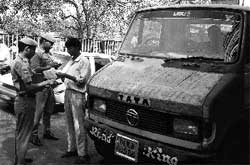On air
On air

on february 12, Delhi Chief Minister Sahib Singh Verma's phone lines were flooded as citizen's of the city called his office continuously and told him clearly that he could not barter their health for votes. They were responding to a call by the Centre for Science and Environment (cse) to call the chief minister's office and express dissatisfaction over the withdrawal of the ban on old and polluting vehicles.
The chief minister was not available till late evening to comment on the action he plans to take. However, the staff at his office said that the calls had been recorded and would be heard by the minister. The staff at the chief minister's office started banging down the phone on citizens who called later in the day, though earlier they put up their best election behaviour and politely took the calls.
The Delhi government had decided to withdraw the ban on old and polluting commercial vehicles a fortnight before the elections, in order to soothe the ruffled feathers of the Federation of Transport Unions Congress (ftuc). The organisation had warned that if the vehicles were banned, the ruling Bharatiya Janata Party (bjp) would lose 20 lakh votes. ftuc held the entire city to ransom by calling a transport strike on February 11. The strike, which was organised a mere five days before the elections, was aimed at making sure that the government sticks to its promise of issuing fitness certificates after rigorous inspection, instead of banning the vehicles. This promise had been extracted from the government earlier, when ftuc organised a chakka jam on February 6.
Anumita Roychowdhury of cse had written to M S Gill, the chief election commissioner (cec), on that day highlighting the serious lapse on part of the bjp government in confirming with the code of conduct. "We hope that the Election Commission has taken note of the media reports that the decision to withdraw the ban was issued on February 4 in wake of the agitation by the Federa-tion of Transport Unions Congress







